Community Psychology: Role, Culture, Ecological Approach Report
VerifiedAdded on 2022/09/18
|12
|3238
|47
Report
AI Summary
This report delves into the field of community psychology, examining the role of a psychology student within the community, the importance of cultural considerations when engaging with diverse populations, and the benefits of using an ecological system approach to understand and address community-related issues. The reflection highlights the significance of community psychology in addressing various social problems, such as substance abuse, domestic violence, and child abuse, with a focus on empowering marginalized and vulnerable groups. The report also discusses the critical role of psychologists in strategic planning, community cohesion, and education, emphasizing the need for cultural competence and humility. Furthermore, it provides an evidence-based explanation of the ecological approach, illustrating its effectiveness in understanding the interconnectedness of individuals and their environments, and its application in resolving social issues. Finally, the report analyzes critical psychology within the South African context, specifically addressing child abuse and neglect, highlighting the need for interventions that consider cultural factors and psychological perspectives.
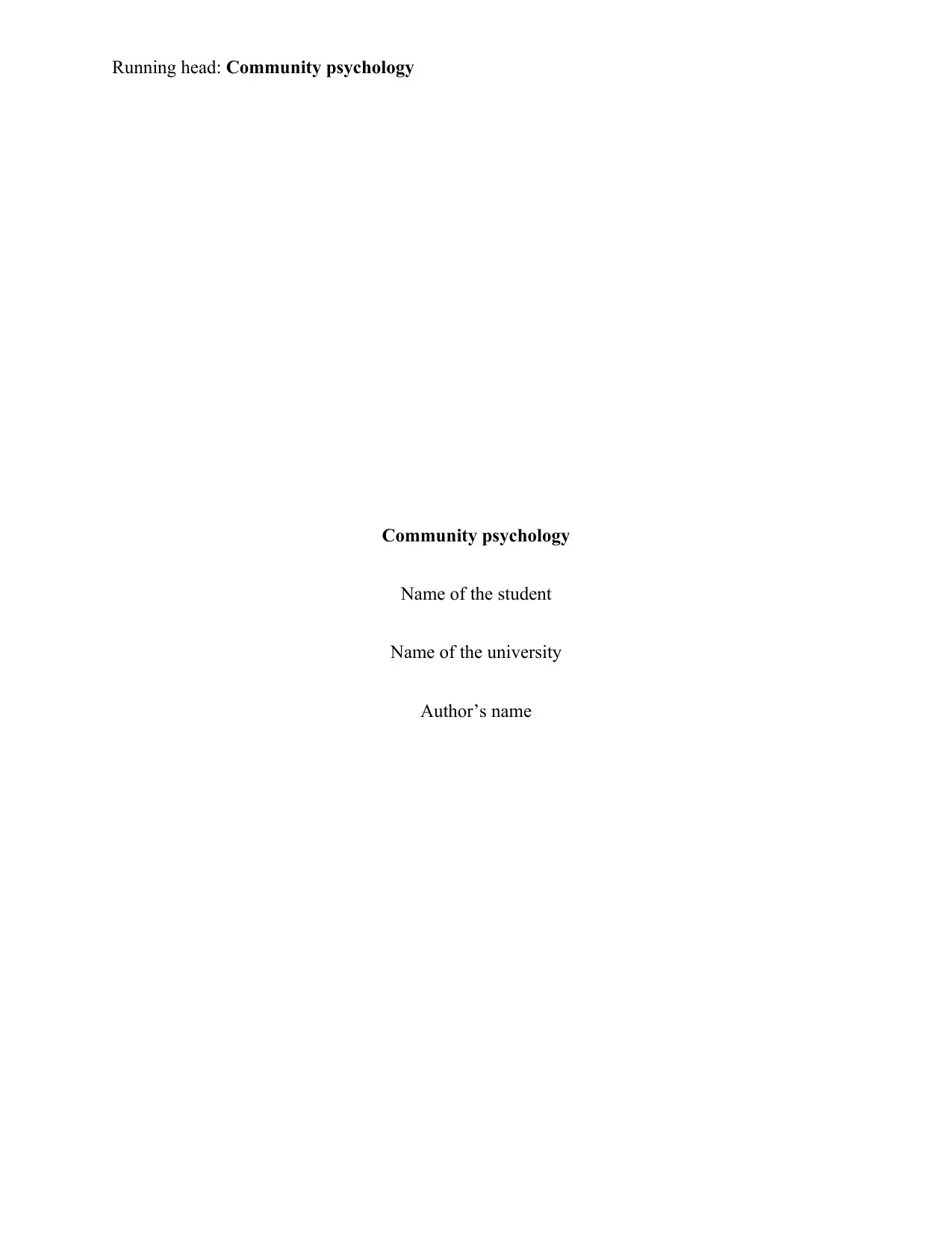
Running head: Community psychology
Community psychology
Name of the student
Name of the university
Author’s name
Community psychology
Name of the student
Name of the university
Author’s name
Paraphrase This Document
Need a fresh take? Get an instant paraphrase of this document with our AI Paraphraser
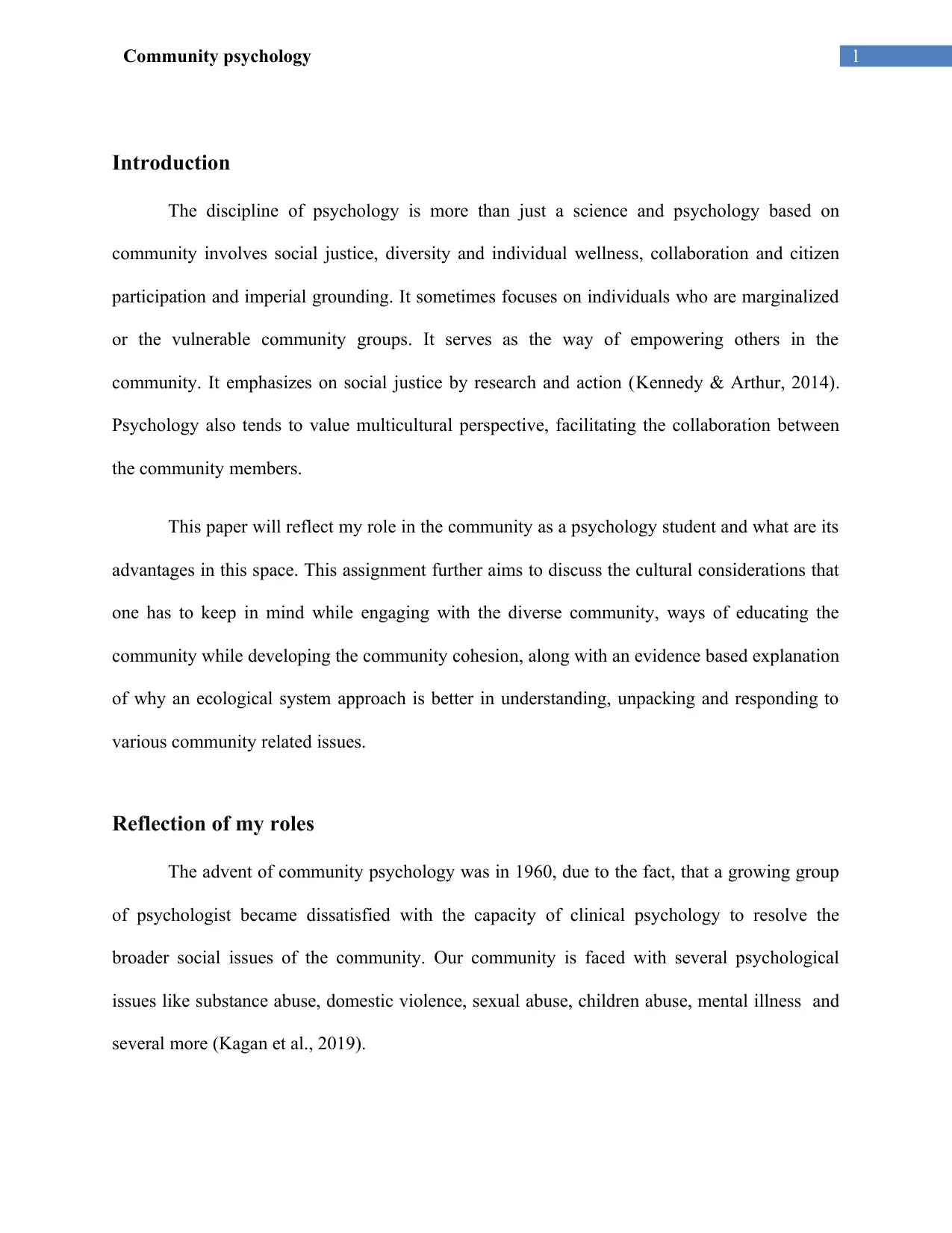
1Community psychology
Introduction
The discipline of psychology is more than just a science and psychology based on
community involves social justice, diversity and individual wellness, collaboration and citizen
participation and imperial grounding. It sometimes focuses on individuals who are marginalized
or the vulnerable community groups. It serves as the way of empowering others in the
community. It emphasizes on social justice by research and action (Kennedy & Arthur, 2014).
Psychology also tends to value multicultural perspective, facilitating the collaboration between
the community members.
This paper will reflect my role in the community as a psychology student and what are its
advantages in this space. This assignment further aims to discuss the cultural considerations that
one has to keep in mind while engaging with the diverse community, ways of educating the
community while developing the community cohesion, along with an evidence based explanation
of why an ecological system approach is better in understanding, unpacking and responding to
various community related issues.
Reflection of my roles
The advent of community psychology was in 1960, due to the fact, that a growing group
of psychologist became dissatisfied with the capacity of clinical psychology to resolve the
broader social issues of the community. Our community is faced with several psychological
issues like substance abuse, domestic violence, sexual abuse, children abuse, mental illness and
several more (Kagan et al., 2019).
Introduction
The discipline of psychology is more than just a science and psychology based on
community involves social justice, diversity and individual wellness, collaboration and citizen
participation and imperial grounding. It sometimes focuses on individuals who are marginalized
or the vulnerable community groups. It serves as the way of empowering others in the
community. It emphasizes on social justice by research and action (Kennedy & Arthur, 2014).
Psychology also tends to value multicultural perspective, facilitating the collaboration between
the community members.
This paper will reflect my role in the community as a psychology student and what are its
advantages in this space. This assignment further aims to discuss the cultural considerations that
one has to keep in mind while engaging with the diverse community, ways of educating the
community while developing the community cohesion, along with an evidence based explanation
of why an ecological system approach is better in understanding, unpacking and responding to
various community related issues.
Reflection of my roles
The advent of community psychology was in 1960, due to the fact, that a growing group
of psychologist became dissatisfied with the capacity of clinical psychology to resolve the
broader social issues of the community. Our community is faced with several psychological
issues like substance abuse, domestic violence, sexual abuse, children abuse, mental illness and
several more (Kagan et al., 2019).
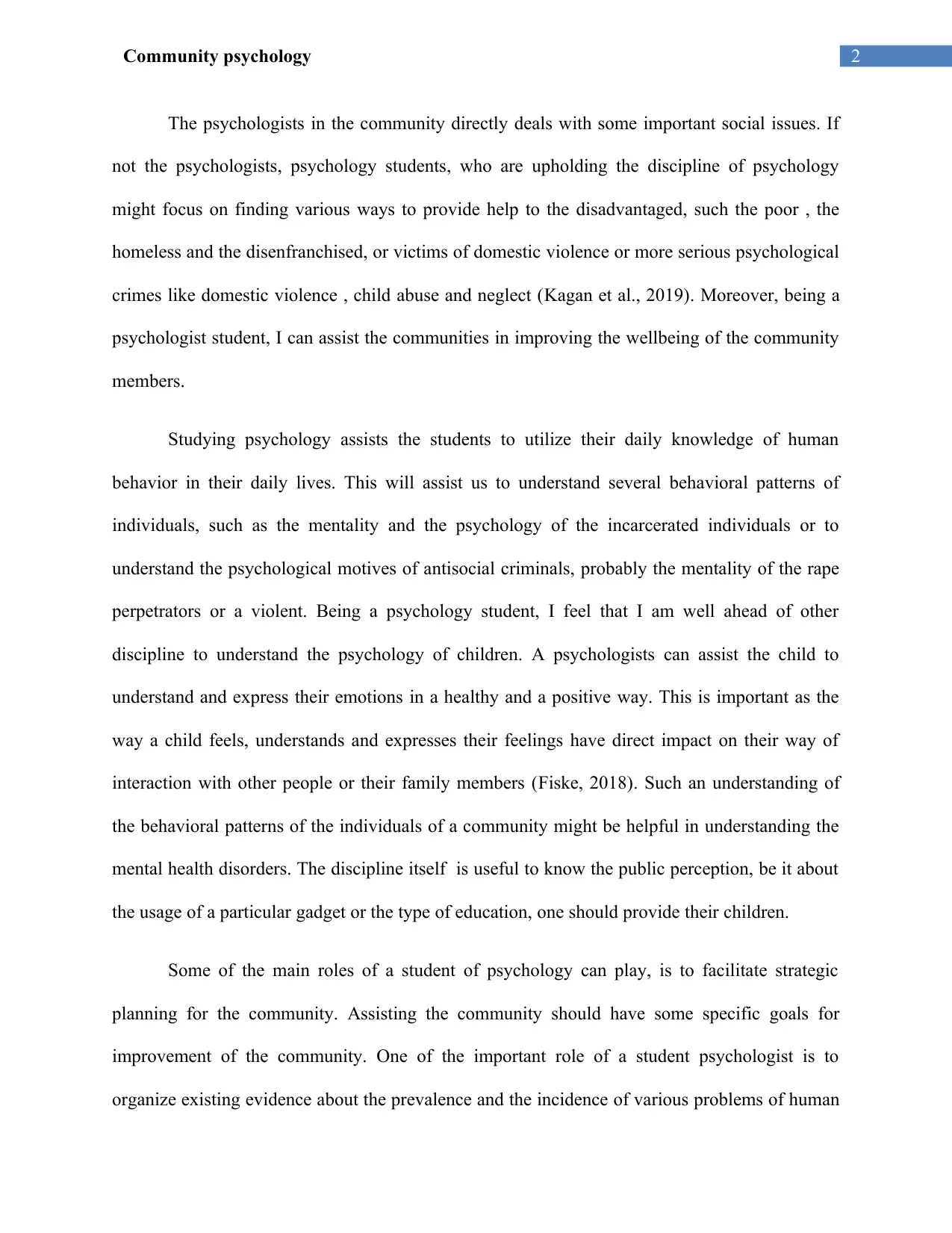
2Community psychology
The psychologists in the community directly deals with some important social issues. If
not the psychologists, psychology students, who are upholding the discipline of psychology
might focus on finding various ways to provide help to the disadvantaged, such the poor , the
homeless and the disenfranchised, or victims of domestic violence or more serious psychological
crimes like domestic violence , child abuse and neglect (Kagan et al., 2019). Moreover, being a
psychologist student, I can assist the communities in improving the wellbeing of the community
members.
Studying psychology assists the students to utilize their daily knowledge of human
behavior in their daily lives. This will assist us to understand several behavioral patterns of
individuals, such as the mentality and the psychology of the incarcerated individuals or to
understand the psychological motives of antisocial criminals, probably the mentality of the rape
perpetrators or a violent. Being a psychology student, I feel that I am well ahead of other
discipline to understand the psychology of children. A psychologists can assist the child to
understand and express their emotions in a healthy and a positive way. This is important as the
way a child feels, understands and expresses their feelings have direct impact on their way of
interaction with other people or their family members (Fiske, 2018). Such an understanding of
the behavioral patterns of the individuals of a community might be helpful in understanding the
mental health disorders. The discipline itself is useful to know the public perception, be it about
the usage of a particular gadget or the type of education, one should provide their children.
Some of the main roles of a student of psychology can play, is to facilitate strategic
planning for the community. Assisting the community should have some specific goals for
improvement of the community. One of the important role of a student psychologist is to
organize existing evidence about the prevalence and the incidence of various problems of human
The psychologists in the community directly deals with some important social issues. If
not the psychologists, psychology students, who are upholding the discipline of psychology
might focus on finding various ways to provide help to the disadvantaged, such the poor , the
homeless and the disenfranchised, or victims of domestic violence or more serious psychological
crimes like domestic violence , child abuse and neglect (Kagan et al., 2019). Moreover, being a
psychologist student, I can assist the communities in improving the wellbeing of the community
members.
Studying psychology assists the students to utilize their daily knowledge of human
behavior in their daily lives. This will assist us to understand several behavioral patterns of
individuals, such as the mentality and the psychology of the incarcerated individuals or to
understand the psychological motives of antisocial criminals, probably the mentality of the rape
perpetrators or a violent. Being a psychology student, I feel that I am well ahead of other
discipline to understand the psychology of children. A psychologists can assist the child to
understand and express their emotions in a healthy and a positive way. This is important as the
way a child feels, understands and expresses their feelings have direct impact on their way of
interaction with other people or their family members (Fiske, 2018). Such an understanding of
the behavioral patterns of the individuals of a community might be helpful in understanding the
mental health disorders. The discipline itself is useful to know the public perception, be it about
the usage of a particular gadget or the type of education, one should provide their children.
Some of the main roles of a student of psychology can play, is to facilitate strategic
planning for the community. Assisting the community should have some specific goals for
improvement of the community. One of the important role of a student psychologist is to
organize existing evidence about the prevalence and the incidence of various problems of human
⊘ This is a preview!⊘
Do you want full access?
Subscribe today to unlock all pages.

Trusted by 1+ million students worldwide
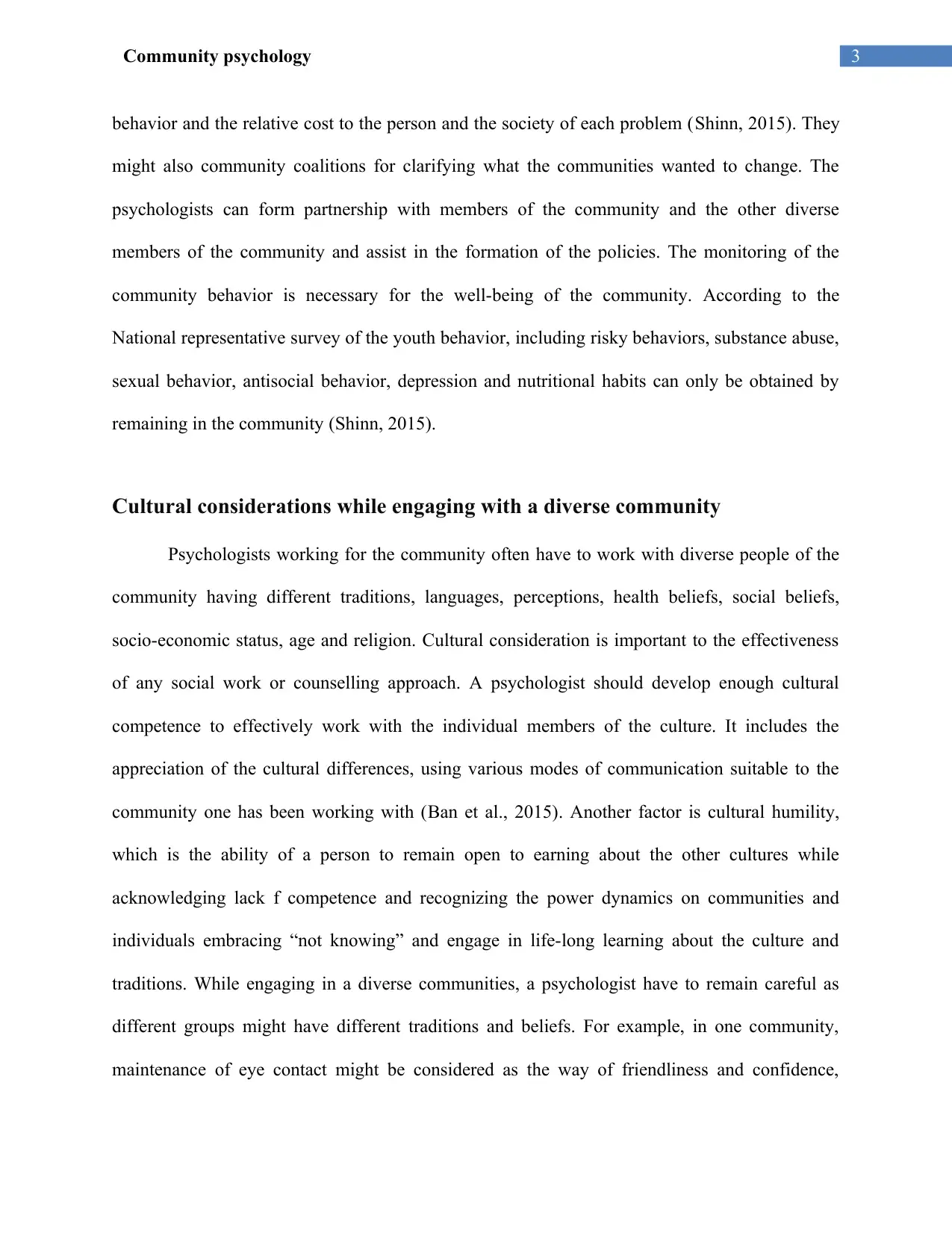
3Community psychology
behavior and the relative cost to the person and the society of each problem (Shinn, 2015). They
might also community coalitions for clarifying what the communities wanted to change. The
psychologists can form partnership with members of the community and the other diverse
members of the community and assist in the formation of the policies. The monitoring of the
community behavior is necessary for the well-being of the community. According to the
National representative survey of the youth behavior, including risky behaviors, substance abuse,
sexual behavior, antisocial behavior, depression and nutritional habits can only be obtained by
remaining in the community (Shinn, 2015).
Cultural considerations while engaging with a diverse community
Psychologists working for the community often have to work with diverse people of the
community having different traditions, languages, perceptions, health beliefs, social beliefs,
socio-economic status, age and religion. Cultural consideration is important to the effectiveness
of any social work or counselling approach. A psychologist should develop enough cultural
competence to effectively work with the individual members of the culture. It includes the
appreciation of the cultural differences, using various modes of communication suitable to the
community one has been working with (Ban et al., 2015). Another factor is cultural humility,
which is the ability of a person to remain open to earning about the other cultures while
acknowledging lack f competence and recognizing the power dynamics on communities and
individuals embracing “not knowing” and engage in life-long learning about the culture and
traditions. While engaging in a diverse communities, a psychologist have to remain careful as
different groups might have different traditions and beliefs. For example, in one community,
maintenance of eye contact might be considered as the way of friendliness and confidence,
behavior and the relative cost to the person and the society of each problem (Shinn, 2015). They
might also community coalitions for clarifying what the communities wanted to change. The
psychologists can form partnership with members of the community and the other diverse
members of the community and assist in the formation of the policies. The monitoring of the
community behavior is necessary for the well-being of the community. According to the
National representative survey of the youth behavior, including risky behaviors, substance abuse,
sexual behavior, antisocial behavior, depression and nutritional habits can only be obtained by
remaining in the community (Shinn, 2015).
Cultural considerations while engaging with a diverse community
Psychologists working for the community often have to work with diverse people of the
community having different traditions, languages, perceptions, health beliefs, social beliefs,
socio-economic status, age and religion. Cultural consideration is important to the effectiveness
of any social work or counselling approach. A psychologist should develop enough cultural
competence to effectively work with the individual members of the culture. It includes the
appreciation of the cultural differences, using various modes of communication suitable to the
community one has been working with (Ban et al., 2015). Another factor is cultural humility,
which is the ability of a person to remain open to earning about the other cultures while
acknowledging lack f competence and recognizing the power dynamics on communities and
individuals embracing “not knowing” and engage in life-long learning about the culture and
traditions. While engaging in a diverse communities, a psychologist have to remain careful as
different groups might have different traditions and beliefs. For example, in one community,
maintenance of eye contact might be considered as the way of friendliness and confidence,
Paraphrase This Document
Need a fresh take? Get an instant paraphrase of this document with our AI Paraphraser
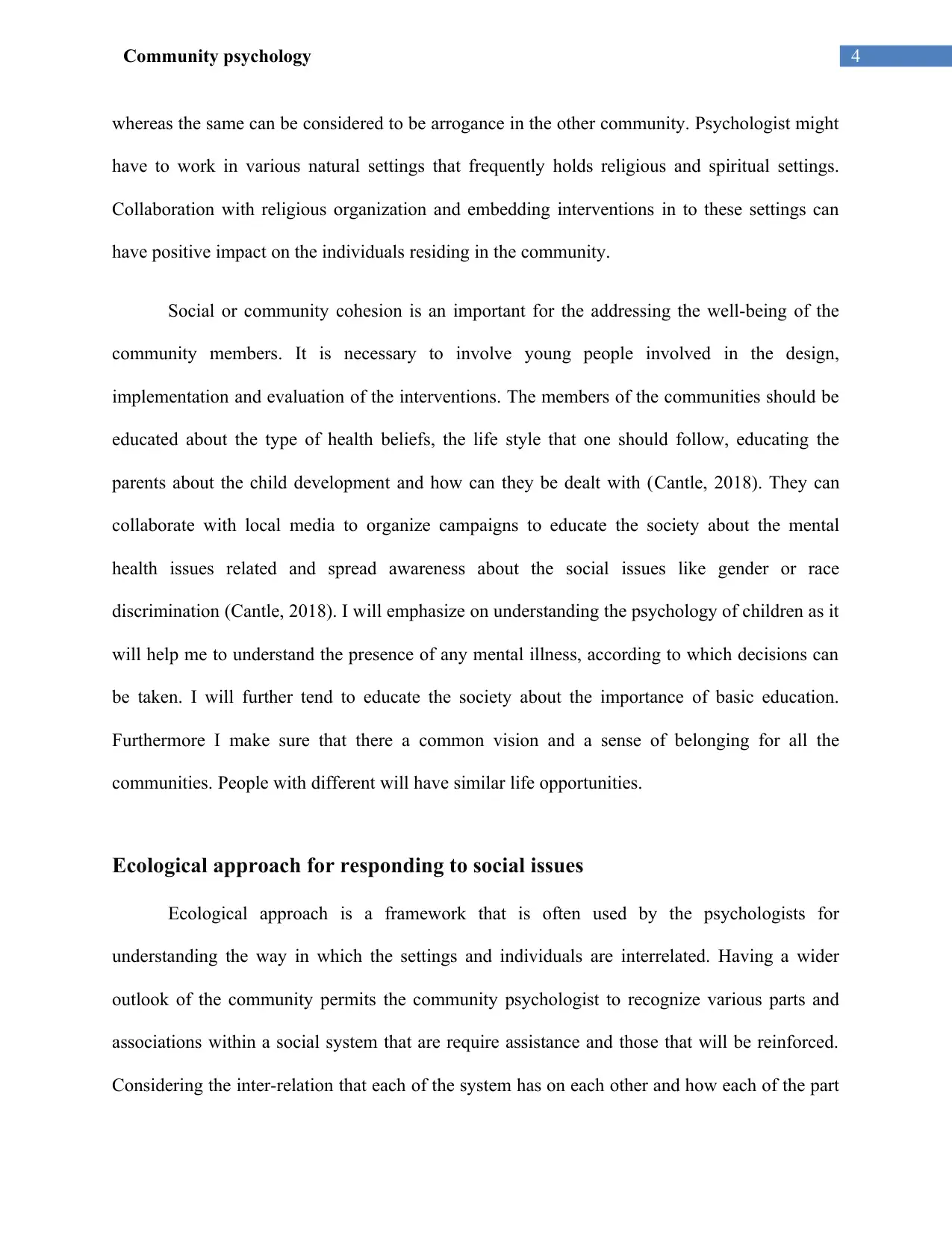
4Community psychology
whereas the same can be considered to be arrogance in the other community. Psychologist might
have to work in various natural settings that frequently holds religious and spiritual settings.
Collaboration with religious organization and embedding interventions in to these settings can
have positive impact on the individuals residing in the community.
Social or community cohesion is an important for the addressing the well-being of the
community members. It is necessary to involve young people involved in the design,
implementation and evaluation of the interventions. The members of the communities should be
educated about the type of health beliefs, the life style that one should follow, educating the
parents about the child development and how can they be dealt with (Cantle, 2018). They can
collaborate with local media to organize campaigns to educate the society about the mental
health issues related and spread awareness about the social issues like gender or race
discrimination (Cantle, 2018). I will emphasize on understanding the psychology of children as it
will help me to understand the presence of any mental illness, according to which decisions can
be taken. I will further tend to educate the society about the importance of basic education.
Furthermore I make sure that there a common vision and a sense of belonging for all the
communities. People with different will have similar life opportunities.
Ecological approach for responding to social issues
Ecological approach is a framework that is often used by the psychologists for
understanding the way in which the settings and individuals are interrelated. Having a wider
outlook of the community permits the community psychologist to recognize various parts and
associations within a social system that are require assistance and those that will be reinforced.
Considering the inter-relation that each of the system has on each other and how each of the part
whereas the same can be considered to be arrogance in the other community. Psychologist might
have to work in various natural settings that frequently holds religious and spiritual settings.
Collaboration with religious organization and embedding interventions in to these settings can
have positive impact on the individuals residing in the community.
Social or community cohesion is an important for the addressing the well-being of the
community members. It is necessary to involve young people involved in the design,
implementation and evaluation of the interventions. The members of the communities should be
educated about the type of health beliefs, the life style that one should follow, educating the
parents about the child development and how can they be dealt with (Cantle, 2018). They can
collaborate with local media to organize campaigns to educate the society about the mental
health issues related and spread awareness about the social issues like gender or race
discrimination (Cantle, 2018). I will emphasize on understanding the psychology of children as it
will help me to understand the presence of any mental illness, according to which decisions can
be taken. I will further tend to educate the society about the importance of basic education.
Furthermore I make sure that there a common vision and a sense of belonging for all the
communities. People with different will have similar life opportunities.
Ecological approach for responding to social issues
Ecological approach is a framework that is often used by the psychologists for
understanding the way in which the settings and individuals are interrelated. Having a wider
outlook of the community permits the community psychologist to recognize various parts and
associations within a social system that are require assistance and those that will be reinforced.
Considering the inter-relation that each of the system has on each other and how each of the part
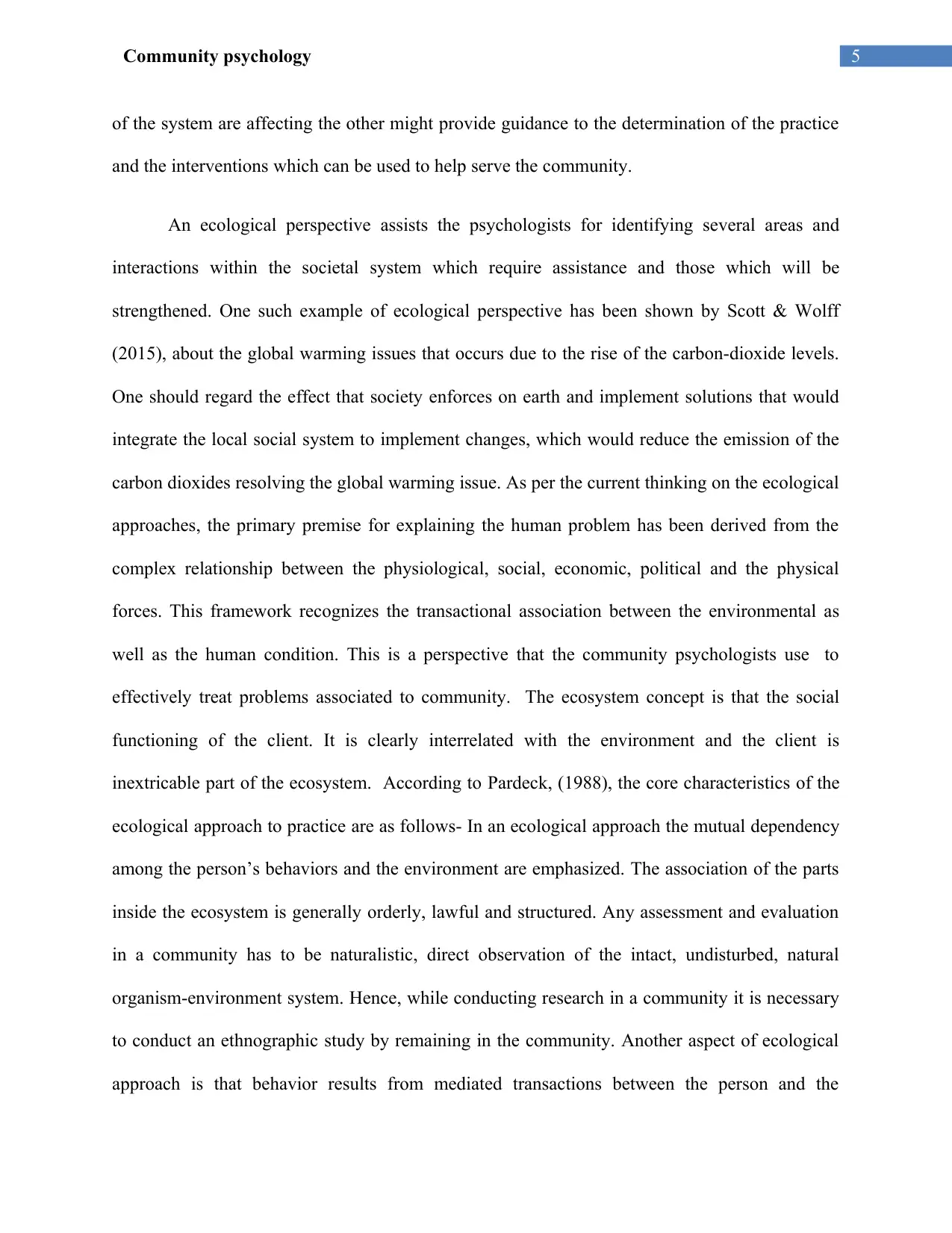
5Community psychology
of the system are affecting the other might provide guidance to the determination of the practice
and the interventions which can be used to help serve the community.
An ecological perspective assists the psychologists for identifying several areas and
interactions within the societal system which require assistance and those which will be
strengthened. One such example of ecological perspective has been shown by Scott & Wolff
(2015), about the global warming issues that occurs due to the rise of the carbon-dioxide levels.
One should regard the effect that society enforces on earth and implement solutions that would
integrate the local social system to implement changes, which would reduce the emission of the
carbon dioxides resolving the global warming issue. As per the current thinking on the ecological
approaches, the primary premise for explaining the human problem has been derived from the
complex relationship between the physiological, social, economic, political and the physical
forces. This framework recognizes the transactional association between the environmental as
well as the human condition. This is a perspective that the community psychologists use to
effectively treat problems associated to community. The ecosystem concept is that the social
functioning of the client. It is clearly interrelated with the environment and the client is
inextricable part of the ecosystem. According to Pardeck, (1988), the core characteristics of the
ecological approach to practice are as follows- In an ecological approach the mutual dependency
among the person’s behaviors and the environment are emphasized. The association of the parts
inside the ecosystem is generally orderly, lawful and structured. Any assessment and evaluation
in a community has to be naturalistic, direct observation of the intact, undisturbed, natural
organism-environment system. Hence, while conducting research in a community it is necessary
to conduct an ethnographic study by remaining in the community. Another aspect of ecological
approach is that behavior results from mediated transactions between the person and the
of the system are affecting the other might provide guidance to the determination of the practice
and the interventions which can be used to help serve the community.
An ecological perspective assists the psychologists for identifying several areas and
interactions within the societal system which require assistance and those which will be
strengthened. One such example of ecological perspective has been shown by Scott & Wolff
(2015), about the global warming issues that occurs due to the rise of the carbon-dioxide levels.
One should regard the effect that society enforces on earth and implement solutions that would
integrate the local social system to implement changes, which would reduce the emission of the
carbon dioxides resolving the global warming issue. As per the current thinking on the ecological
approaches, the primary premise for explaining the human problem has been derived from the
complex relationship between the physiological, social, economic, political and the physical
forces. This framework recognizes the transactional association between the environmental as
well as the human condition. This is a perspective that the community psychologists use to
effectively treat problems associated to community. The ecosystem concept is that the social
functioning of the client. It is clearly interrelated with the environment and the client is
inextricable part of the ecosystem. According to Pardeck, (1988), the core characteristics of the
ecological approach to practice are as follows- In an ecological approach the mutual dependency
among the person’s behaviors and the environment are emphasized. The association of the parts
inside the ecosystem is generally orderly, lawful and structured. Any assessment and evaluation
in a community has to be naturalistic, direct observation of the intact, undisturbed, natural
organism-environment system. Hence, while conducting research in a community it is necessary
to conduct an ethnographic study by remaining in the community. Another aspect of ecological
approach is that behavior results from mediated transactions between the person and the
⊘ This is a preview!⊘
Do you want full access?
Subscribe today to unlock all pages.

Trusted by 1+ million students worldwide
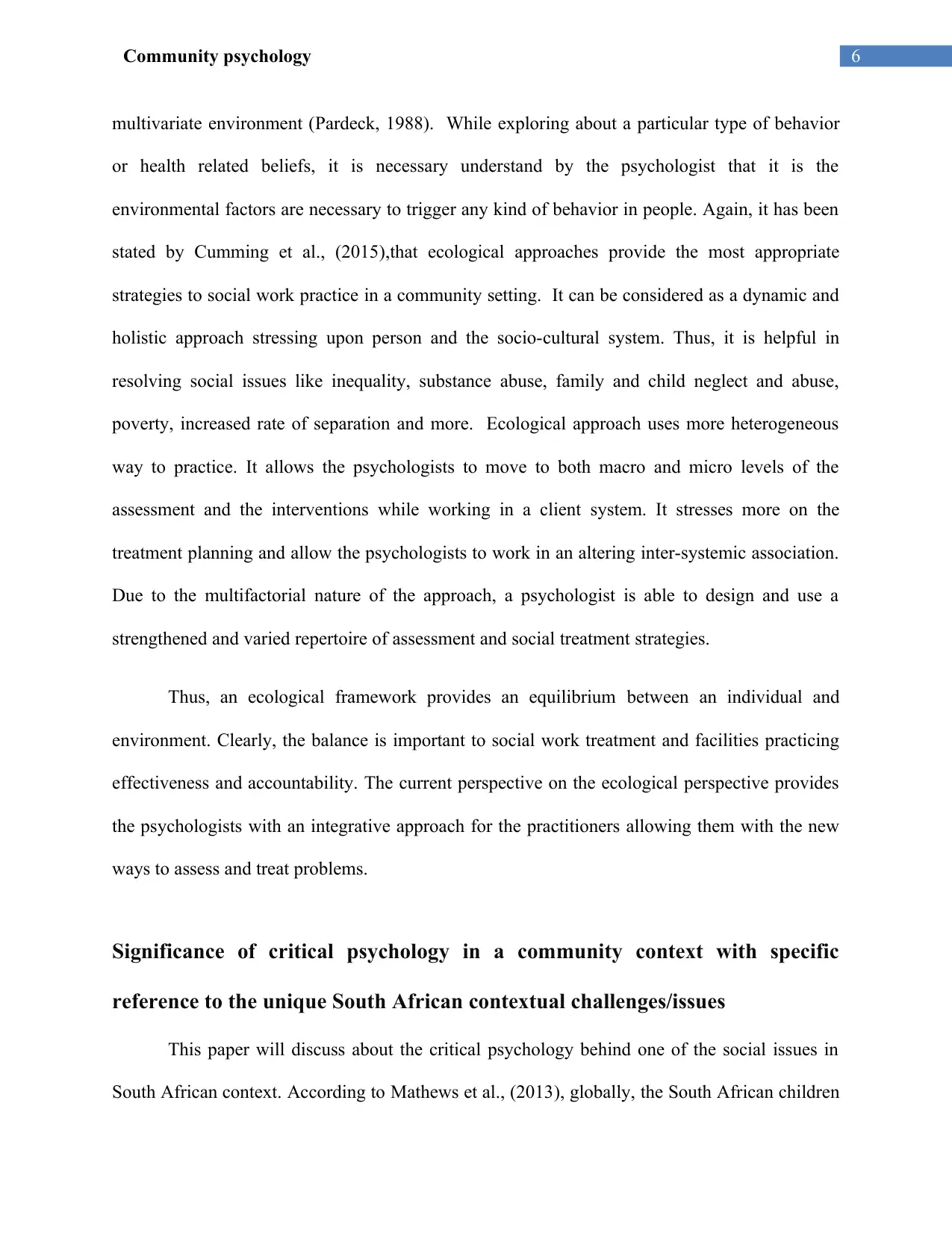
6Community psychology
multivariate environment (Pardeck, 1988). While exploring about a particular type of behavior
or health related beliefs, it is necessary understand by the psychologist that it is the
environmental factors are necessary to trigger any kind of behavior in people. Again, it has been
stated by Cumming et al., (2015),that ecological approaches provide the most appropriate
strategies to social work practice in a community setting. It can be considered as a dynamic and
holistic approach stressing upon person and the socio-cultural system. Thus, it is helpful in
resolving social issues like inequality, substance abuse, family and child neglect and abuse,
poverty, increased rate of separation and more. Ecological approach uses more heterogeneous
way to practice. It allows the psychologists to move to both macro and micro levels of the
assessment and the interventions while working in a client system. It stresses more on the
treatment planning and allow the psychologists to work in an altering inter-systemic association.
Due to the multifactorial nature of the approach, a psychologist is able to design and use a
strengthened and varied repertoire of assessment and social treatment strategies.
Thus, an ecological framework provides an equilibrium between an individual and
environment. Clearly, the balance is important to social work treatment and facilities practicing
effectiveness and accountability. The current perspective on the ecological perspective provides
the psychologists with an integrative approach for the practitioners allowing them with the new
ways to assess and treat problems.
Significance of critical psychology in a community context with specific
reference to the unique South African contextual challenges/issues
This paper will discuss about the critical psychology behind one of the social issues in
South African context. According to Mathews et al., (2013), globally, the South African children
multivariate environment (Pardeck, 1988). While exploring about a particular type of behavior
or health related beliefs, it is necessary understand by the psychologist that it is the
environmental factors are necessary to trigger any kind of behavior in people. Again, it has been
stated by Cumming et al., (2015),that ecological approaches provide the most appropriate
strategies to social work practice in a community setting. It can be considered as a dynamic and
holistic approach stressing upon person and the socio-cultural system. Thus, it is helpful in
resolving social issues like inequality, substance abuse, family and child neglect and abuse,
poverty, increased rate of separation and more. Ecological approach uses more heterogeneous
way to practice. It allows the psychologists to move to both macro and micro levels of the
assessment and the interventions while working in a client system. It stresses more on the
treatment planning and allow the psychologists to work in an altering inter-systemic association.
Due to the multifactorial nature of the approach, a psychologist is able to design and use a
strengthened and varied repertoire of assessment and social treatment strategies.
Thus, an ecological framework provides an equilibrium between an individual and
environment. Clearly, the balance is important to social work treatment and facilities practicing
effectiveness and accountability. The current perspective on the ecological perspective provides
the psychologists with an integrative approach for the practitioners allowing them with the new
ways to assess and treat problems.
Significance of critical psychology in a community context with specific
reference to the unique South African contextual challenges/issues
This paper will discuss about the critical psychology behind one of the social issues in
South African context. According to Mathews et al., (2013), globally, the South African children
Paraphrase This Document
Need a fresh take? Get an instant paraphrase of this document with our AI Paraphraser
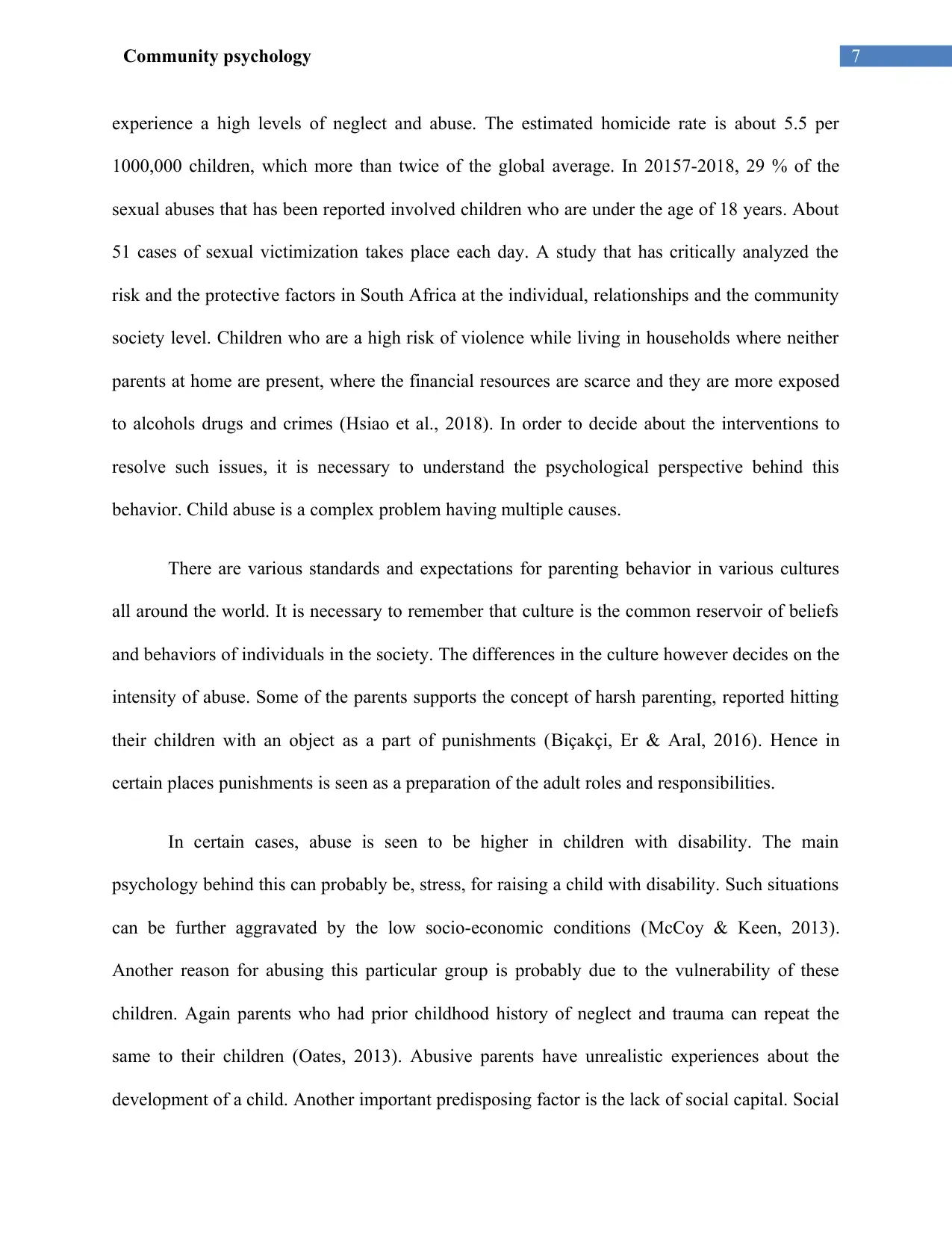
7Community psychology
experience a high levels of neglect and abuse. The estimated homicide rate is about 5.5 per
1000,000 children, which more than twice of the global average. In 20157-2018, 29 % of the
sexual abuses that has been reported involved children who are under the age of 18 years. About
51 cases of sexual victimization takes place each day. A study that has critically analyzed the
risk and the protective factors in South Africa at the individual, relationships and the community
society level. Children who are a high risk of violence while living in households where neither
parents at home are present, where the financial resources are scarce and they are more exposed
to alcohols drugs and crimes (Hsiao et al., 2018). In order to decide about the interventions to
resolve such issues, it is necessary to understand the psychological perspective behind this
behavior. Child abuse is a complex problem having multiple causes.
There are various standards and expectations for parenting behavior in various cultures
all around the world. It is necessary to remember that culture is the common reservoir of beliefs
and behaviors of individuals in the society. The differences in the culture however decides on the
intensity of abuse. Some of the parents supports the concept of harsh parenting, reported hitting
their children with an object as a part of punishments (Biçakçi, Er & Aral, 2016). Hence in
certain places punishments is seen as a preparation of the adult roles and responsibilities.
In certain cases, abuse is seen to be higher in children with disability. The main
psychology behind this can probably be, stress, for raising a child with disability. Such situations
can be further aggravated by the low socio-economic conditions (McCoy & Keen, 2013).
Another reason for abusing this particular group is probably due to the vulnerability of these
children. Again parents who had prior childhood history of neglect and trauma can repeat the
same to their children (Oates, 2013). Abusive parents have unrealistic experiences about the
development of a child. Another important predisposing factor is the lack of social capital. Social
experience a high levels of neglect and abuse. The estimated homicide rate is about 5.5 per
1000,000 children, which more than twice of the global average. In 20157-2018, 29 % of the
sexual abuses that has been reported involved children who are under the age of 18 years. About
51 cases of sexual victimization takes place each day. A study that has critically analyzed the
risk and the protective factors in South Africa at the individual, relationships and the community
society level. Children who are a high risk of violence while living in households where neither
parents at home are present, where the financial resources are scarce and they are more exposed
to alcohols drugs and crimes (Hsiao et al., 2018). In order to decide about the interventions to
resolve such issues, it is necessary to understand the psychological perspective behind this
behavior. Child abuse is a complex problem having multiple causes.
There are various standards and expectations for parenting behavior in various cultures
all around the world. It is necessary to remember that culture is the common reservoir of beliefs
and behaviors of individuals in the society. The differences in the culture however decides on the
intensity of abuse. Some of the parents supports the concept of harsh parenting, reported hitting
their children with an object as a part of punishments (Biçakçi, Er & Aral, 2016). Hence in
certain places punishments is seen as a preparation of the adult roles and responsibilities.
In certain cases, abuse is seen to be higher in children with disability. The main
psychology behind this can probably be, stress, for raising a child with disability. Such situations
can be further aggravated by the low socio-economic conditions (McCoy & Keen, 2013).
Another reason for abusing this particular group is probably due to the vulnerability of these
children. Again parents who had prior childhood history of neglect and trauma can repeat the
same to their children (Oates, 2013). Abusive parents have unrealistic experiences about the
development of a child. Another important predisposing factor is the lack of social capital. Social
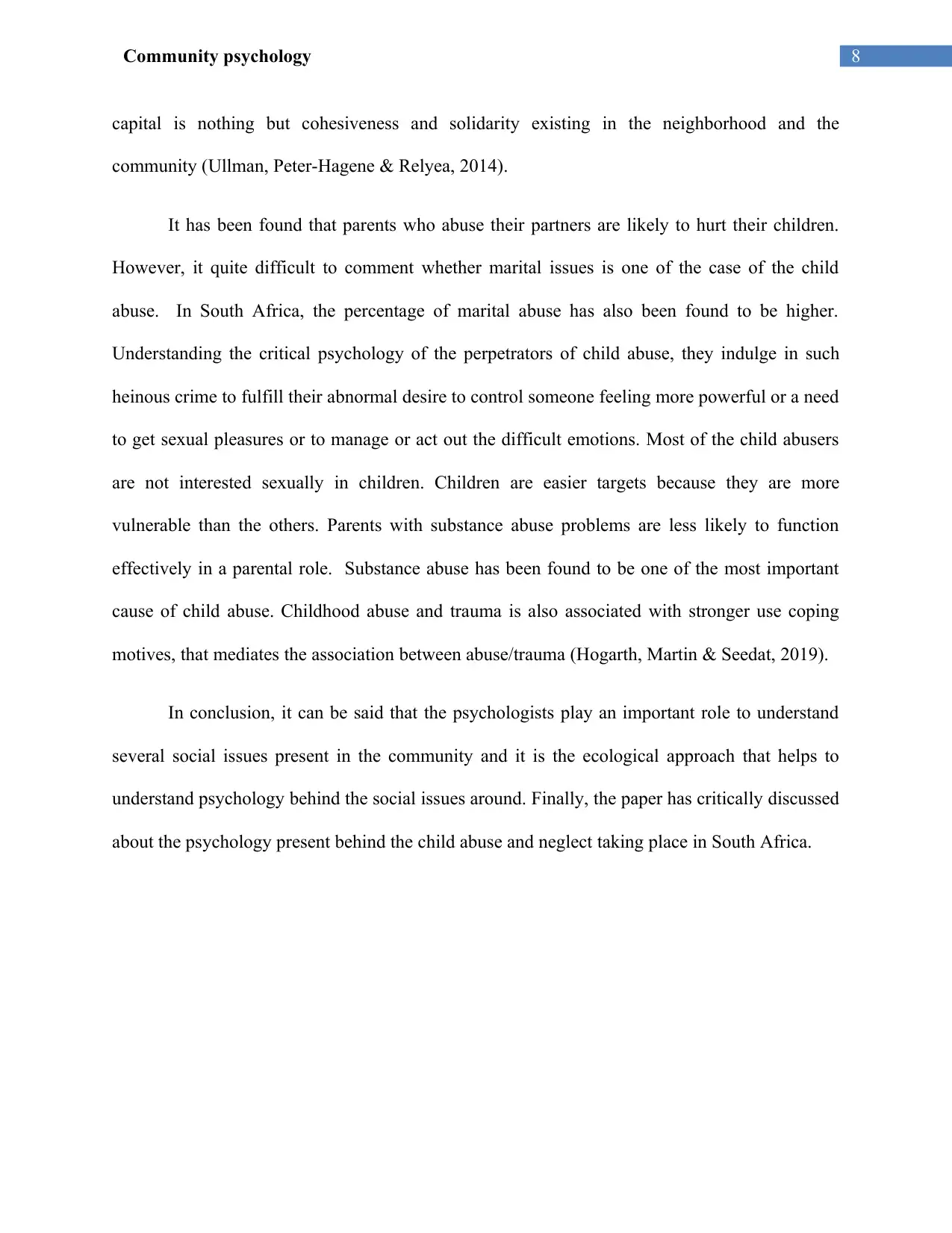
8Community psychology
capital is nothing but cohesiveness and solidarity existing in the neighborhood and the
community (Ullman, Peter-Hagene & Relyea, 2014).
It has been found that parents who abuse their partners are likely to hurt their children.
However, it quite difficult to comment whether marital issues is one of the case of the child
abuse. In South Africa, the percentage of marital abuse has also been found to be higher.
Understanding the critical psychology of the perpetrators of child abuse, they indulge in such
heinous crime to fulfill their abnormal desire to control someone feeling more powerful or a need
to get sexual pleasures or to manage or act out the difficult emotions. Most of the child abusers
are not interested sexually in children. Children are easier targets because they are more
vulnerable than the others. Parents with substance abuse problems are less likely to function
effectively in a parental role. Substance abuse has been found to be one of the most important
cause of child abuse. Childhood abuse and trauma is also associated with stronger use coping
motives, that mediates the association between abuse/trauma (Hogarth, Martin & Seedat, 2019).
In conclusion, it can be said that the psychologists play an important role to understand
several social issues present in the community and it is the ecological approach that helps to
understand psychology behind the social issues around. Finally, the paper has critically discussed
about the psychology present behind the child abuse and neglect taking place in South Africa.
capital is nothing but cohesiveness and solidarity existing in the neighborhood and the
community (Ullman, Peter-Hagene & Relyea, 2014).
It has been found that parents who abuse their partners are likely to hurt their children.
However, it quite difficult to comment whether marital issues is one of the case of the child
abuse. In South Africa, the percentage of marital abuse has also been found to be higher.
Understanding the critical psychology of the perpetrators of child abuse, they indulge in such
heinous crime to fulfill their abnormal desire to control someone feeling more powerful or a need
to get sexual pleasures or to manage or act out the difficult emotions. Most of the child abusers
are not interested sexually in children. Children are easier targets because they are more
vulnerable than the others. Parents with substance abuse problems are less likely to function
effectively in a parental role. Substance abuse has been found to be one of the most important
cause of child abuse. Childhood abuse and trauma is also associated with stronger use coping
motives, that mediates the association between abuse/trauma (Hogarth, Martin & Seedat, 2019).
In conclusion, it can be said that the psychologists play an important role to understand
several social issues present in the community and it is the ecological approach that helps to
understand psychology behind the social issues around. Finally, the paper has critically discussed
about the psychology present behind the child abuse and neglect taking place in South Africa.
⊘ This is a preview!⊘
Do you want full access?
Subscribe today to unlock all pages.

Trusted by 1+ million students worldwide
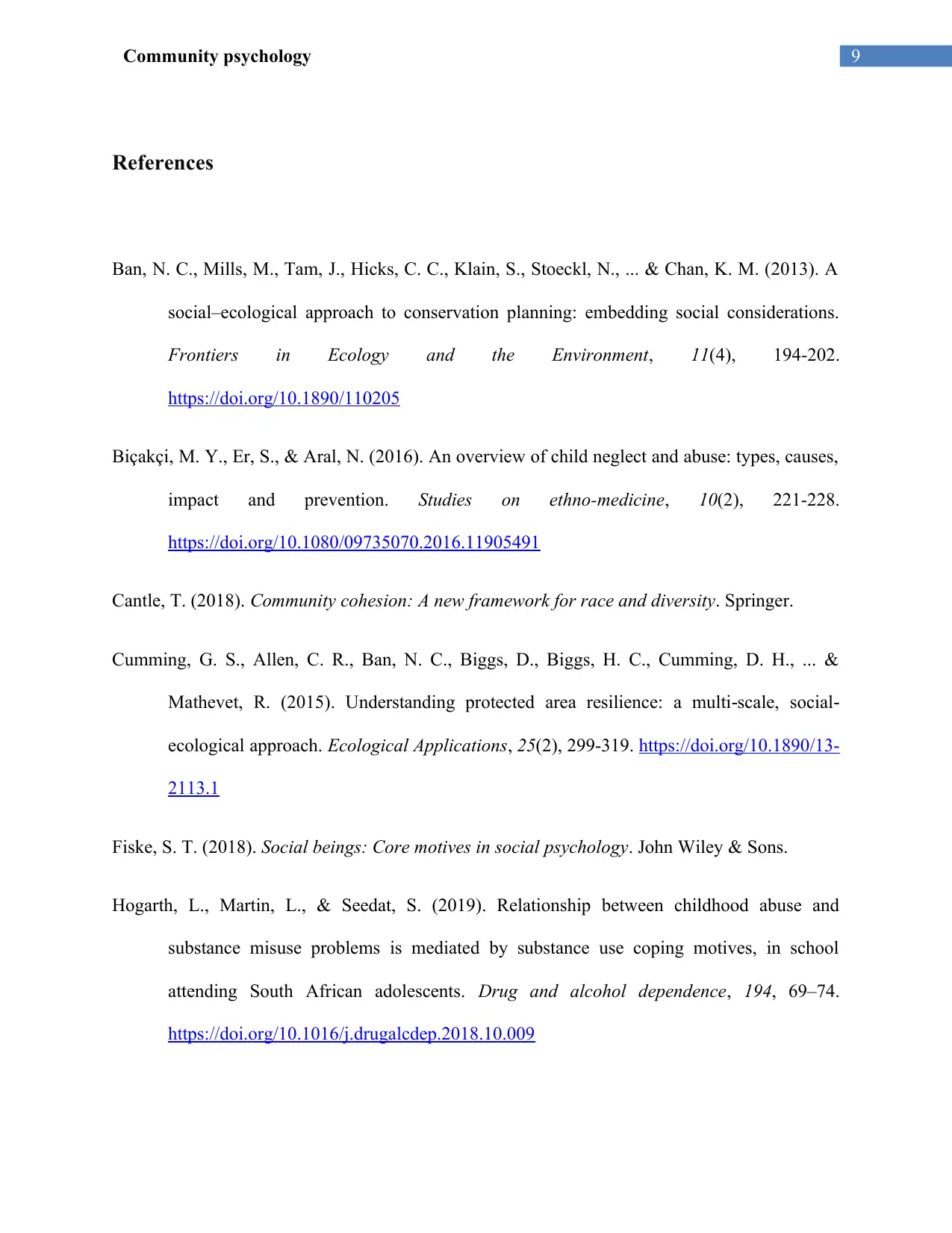
9Community psychology
References
Ban, N. C., Mills, M., Tam, J., Hicks, C. C., Klain, S., Stoeckl, N., ... & Chan, K. M. (2013). A
social–ecological approach to conservation planning: embedding social considerations.
Frontiers in Ecology and the Environment, 11(4), 194-202.
https://doi.org/10.1890/110205
Biçakçi, M. Y., Er, S., & Aral, N. (2016). An overview of child neglect and abuse: types, causes,
impact and prevention. Studies on ethno-medicine, 10(2), 221-228.
https://doi.org/10.1080/09735070.2016.11905491
Cantle, T. (2018). Community cohesion: A new framework for race and diversity. Springer.
Cumming, G. S., Allen, C. R., Ban, N. C., Biggs, D., Biggs, H. C., Cumming, D. H., ... &
Mathevet, R. (2015). Understanding protected area resilience: a multi scale, social‐ ‐
ecological approach. Ecological Applications, 25(2), 299-319. https://doi.org/10.1890/13-
2113.1
Fiske, S. T. (2018). Social beings: Core motives in social psychology. John Wiley & Sons.
Hogarth, L., Martin, L., & Seedat, S. (2019). Relationship between childhood abuse and
substance misuse problems is mediated by substance use coping motives, in school
attending South African adolescents. Drug and alcohol dependence, 194, 69–74.
https://doi.org/10.1016/j.drugalcdep.2018.10.009
References
Ban, N. C., Mills, M., Tam, J., Hicks, C. C., Klain, S., Stoeckl, N., ... & Chan, K. M. (2013). A
social–ecological approach to conservation planning: embedding social considerations.
Frontiers in Ecology and the Environment, 11(4), 194-202.
https://doi.org/10.1890/110205
Biçakçi, M. Y., Er, S., & Aral, N. (2016). An overview of child neglect and abuse: types, causes,
impact and prevention. Studies on ethno-medicine, 10(2), 221-228.
https://doi.org/10.1080/09735070.2016.11905491
Cantle, T. (2018). Community cohesion: A new framework for race and diversity. Springer.
Cumming, G. S., Allen, C. R., Ban, N. C., Biggs, D., Biggs, H. C., Cumming, D. H., ... &
Mathevet, R. (2015). Understanding protected area resilience: a multi scale, social‐ ‐
ecological approach. Ecological Applications, 25(2), 299-319. https://doi.org/10.1890/13-
2113.1
Fiske, S. T. (2018). Social beings: Core motives in social psychology. John Wiley & Sons.
Hogarth, L., Martin, L., & Seedat, S. (2019). Relationship between childhood abuse and
substance misuse problems is mediated by substance use coping motives, in school
attending South African adolescents. Drug and alcohol dependence, 194, 69–74.
https://doi.org/10.1016/j.drugalcdep.2018.10.009
Paraphrase This Document
Need a fresh take? Get an instant paraphrase of this document with our AI Paraphraser
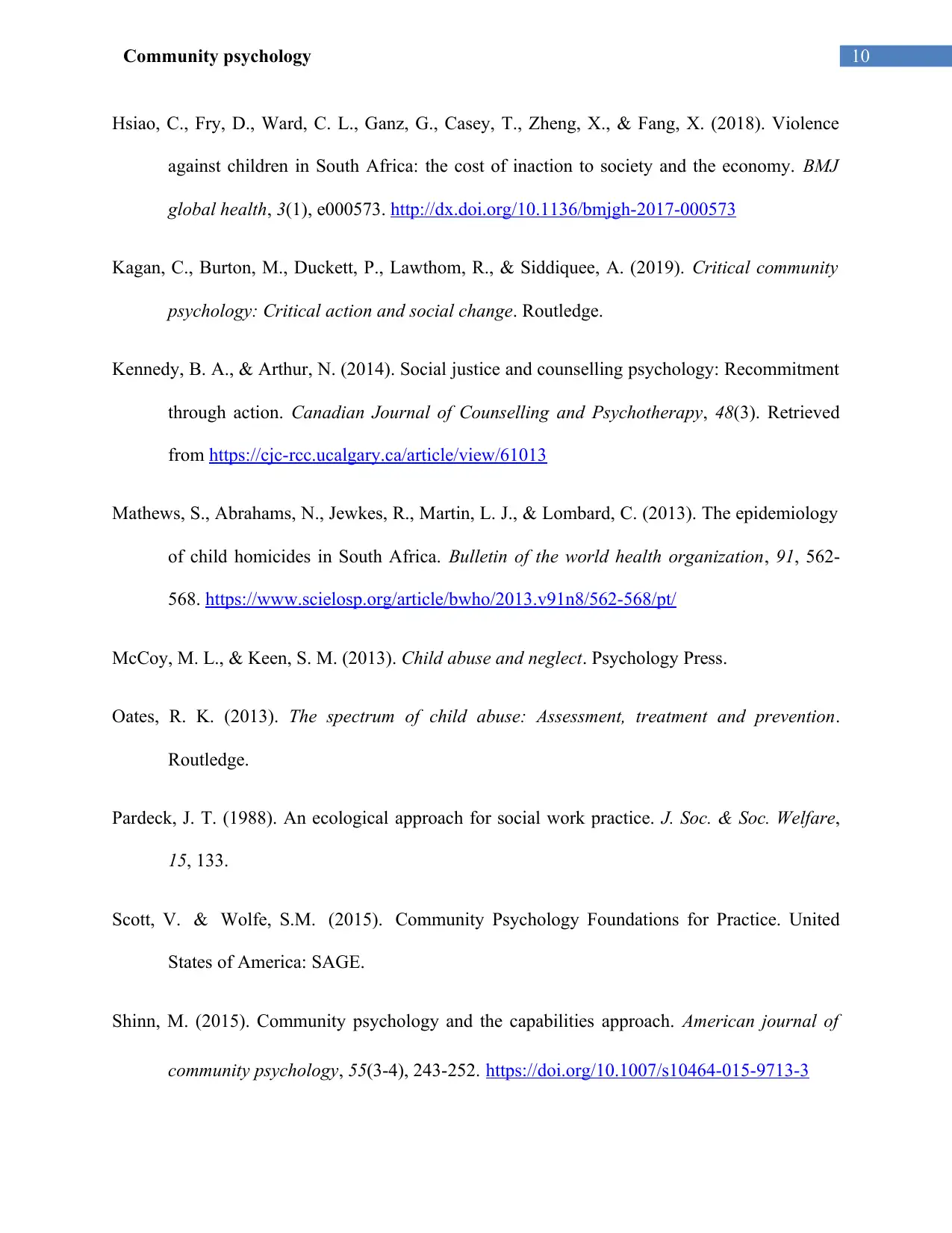
10Community psychology
Hsiao, C., Fry, D., Ward, C. L., Ganz, G., Casey, T., Zheng, X., & Fang, X. (2018). Violence
against children in South Africa: the cost of inaction to society and the economy. BMJ
global health, 3(1), e000573. http://dx.doi.org/10.1136/bmjgh-2017-000573
Kagan, C., Burton, M., Duckett, P., Lawthom, R., & Siddiquee, A. (2019). Critical community
psychology: Critical action and social change. Routledge.
Kennedy, B. A., & Arthur, N. (2014). Social justice and counselling psychology: Recommitment
through action. Canadian Journal of Counselling and Psychotherapy, 48(3). Retrieved
from https://cjc-rcc.ucalgary.ca/article/view/61013
Mathews, S., Abrahams, N., Jewkes, R., Martin, L. J., & Lombard, C. (2013). The epidemiology
of child homicides in South Africa. Bulletin of the world health organization, 91, 562-
568. https://www.scielosp.org/article/bwho/2013.v91n8/562-568/pt/
McCoy, M. L., & Keen, S. M. (2013). Child abuse and neglect. Psychology Press.
Oates, R. K. (2013). The spectrum of child abuse: Assessment, treatment and prevention.
Routledge.
Pardeck, J. T. (1988). An ecological approach for social work practice. J. Soc. & Soc. Welfare,
15, 133.
Scott, V. & Wolfe, S.M. (2015). Community Psychology Foundations for Practice. United
States of America: SAGE.
Shinn, M. (2015). Community psychology and the capabilities approach. American journal of
community psychology, 55(3-4), 243-252. https://doi.org/10.1007/s10464-015-9713-3
Hsiao, C., Fry, D., Ward, C. L., Ganz, G., Casey, T., Zheng, X., & Fang, X. (2018). Violence
against children in South Africa: the cost of inaction to society and the economy. BMJ
global health, 3(1), e000573. http://dx.doi.org/10.1136/bmjgh-2017-000573
Kagan, C., Burton, M., Duckett, P., Lawthom, R., & Siddiquee, A. (2019). Critical community
psychology: Critical action and social change. Routledge.
Kennedy, B. A., & Arthur, N. (2014). Social justice and counselling psychology: Recommitment
through action. Canadian Journal of Counselling and Psychotherapy, 48(3). Retrieved
from https://cjc-rcc.ucalgary.ca/article/view/61013
Mathews, S., Abrahams, N., Jewkes, R., Martin, L. J., & Lombard, C. (2013). The epidemiology
of child homicides in South Africa. Bulletin of the world health organization, 91, 562-
568. https://www.scielosp.org/article/bwho/2013.v91n8/562-568/pt/
McCoy, M. L., & Keen, S. M. (2013). Child abuse and neglect. Psychology Press.
Oates, R. K. (2013). The spectrum of child abuse: Assessment, treatment and prevention.
Routledge.
Pardeck, J. T. (1988). An ecological approach for social work practice. J. Soc. & Soc. Welfare,
15, 133.
Scott, V. & Wolfe, S.M. (2015). Community Psychology Foundations for Practice. United
States of America: SAGE.
Shinn, M. (2015). Community psychology and the capabilities approach. American journal of
community psychology, 55(3-4), 243-252. https://doi.org/10.1007/s10464-015-9713-3
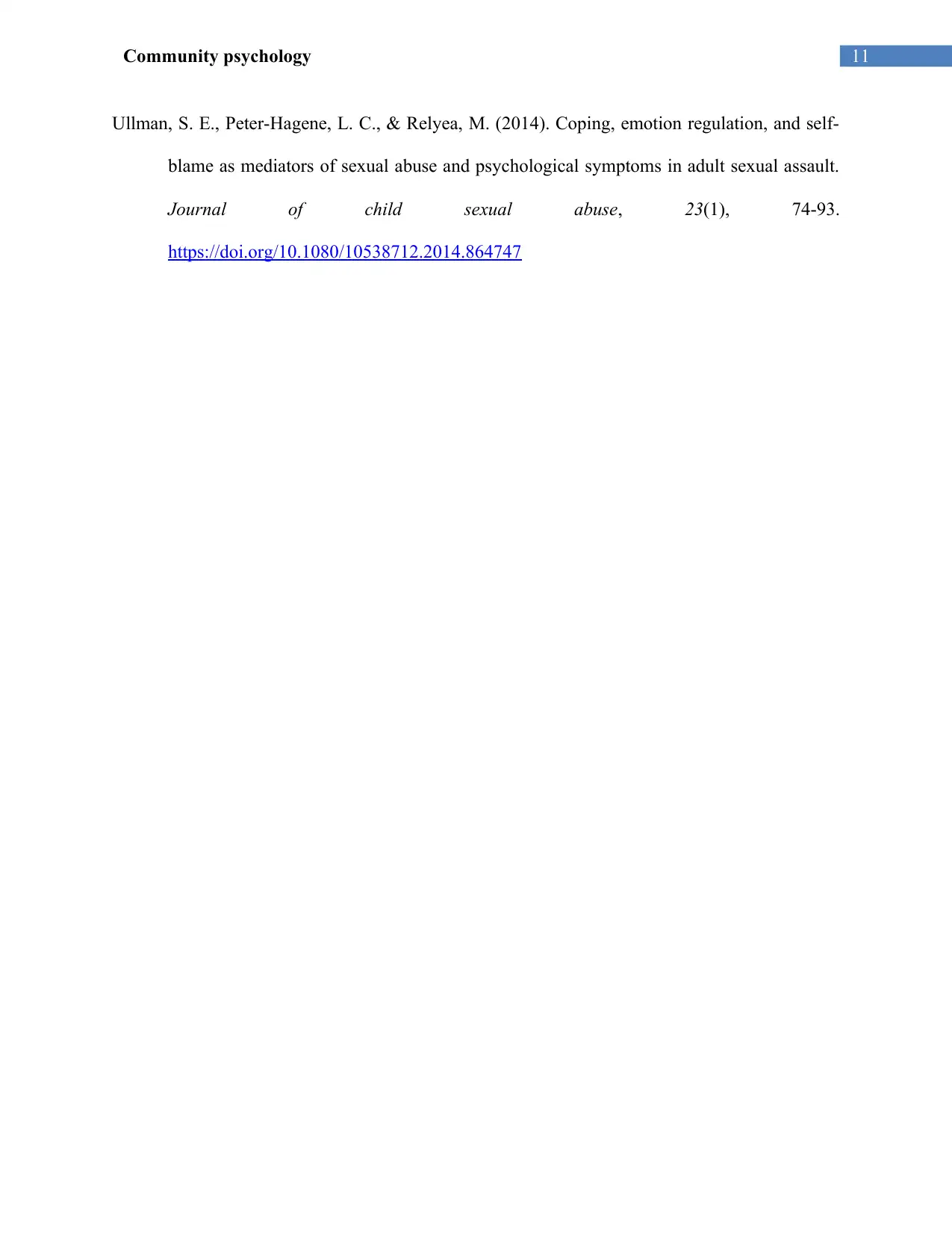
11Community psychology
Ullman, S. E., Peter-Hagene, L. C., & Relyea, M. (2014). Coping, emotion regulation, and self-
blame as mediators of sexual abuse and psychological symptoms in adult sexual assault.
Journal of child sexual abuse, 23(1), 74-93.
https://doi.org/10.1080/10538712.2014.864747
Ullman, S. E., Peter-Hagene, L. C., & Relyea, M. (2014). Coping, emotion regulation, and self-
blame as mediators of sexual abuse and psychological symptoms in adult sexual assault.
Journal of child sexual abuse, 23(1), 74-93.
https://doi.org/10.1080/10538712.2014.864747
⊘ This is a preview!⊘
Do you want full access?
Subscribe today to unlock all pages.

Trusted by 1+ million students worldwide
1 out of 12
Related Documents
Your All-in-One AI-Powered Toolkit for Academic Success.
+13062052269
info@desklib.com
Available 24*7 on WhatsApp / Email
![[object Object]](/_next/static/media/star-bottom.7253800d.svg)
Unlock your academic potential
Copyright © 2020–2026 A2Z Services. All Rights Reserved. Developed and managed by ZUCOL.





